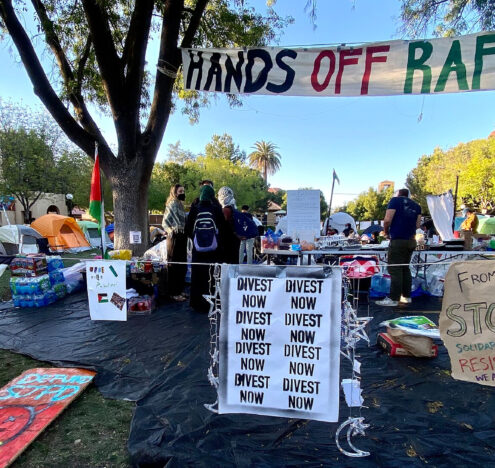In the last two minutes of my Introduction to Global Politics class, my professor pulled up a slide entitled “Feminist Foreign Policy.” With no time left in class, he exited out of the presentation and said not to worry: “This isn’t important, and it won’t be on the exam.”
This year, as I started my career in foreign policy, I have seen the same dismissal of divergent perspectives throughout Washington, DC. From the prevalence of all-male panels to the lack of diversity in almost every meeting I attend – women, People of Color, and Indigenous communities face huge barriers to being part of the foreign policy conversation.
US foreign policy continues to reinforce this patriarchal status quo by relying on tools that disproportionately harm impacted groups. We must radically change our approach to foreign policy to one which uplifts and prioritizes individuals who have been both ignored and actively harmed by a broken system for too long. As we look to the future of American foreign policy, we must draw on the feminist perspective to mirror the make-up and priorities of society — because right now, our foreign policy primarily serves the wealthy white men who write it.
A feminist approach to foreign policy would do just that, centering the voices and needs of not just women, but also People of Color, Indigenous communities, and all who have been oppressed under the status quo. It would aim to uplift all marginalized communities and to promote equity, justice, and liberation through all aspects of foreign relations.
DISPROPORTIONATE IMPACTS
Feminist foreign policy would upend a status quo that clearly harms those who have never been fully represented in policy-making. When women make up 80 percent of the people most affected by climate change, denying its existence is inherently gendered. And this gendered thinking has dire consequences. It is in part because of the US refusal to confront the climate crisis that Indigenous women living near Lake Chad are experiencing food insecurity as a result of living without access to fresh water.
A feminist foreign policy for the United States would confront climate change head-on to ensure all people have access to food, water, and a safe place to live
Current US foreign policy also harms historically marginalized groups around the world through its prioritization of the military over diplomacy. In Afghanistan, US drone strikes kill those whose voices and needs are consistently left out of decisions and peace processes, women and children, with impunity. In Yemen, US weapons sales fuel instability and famine, leading families to force young girls into marriage so they can feed the rest of their children.
But it’s not just women who suffer under current US foreign policy. Nuclear policies have caused irreparable damage to Indigenous communities and others in the United States, as well as abroad. The US conducted nuclear testing in the Marshall Islands for over a decade, resulting in water and food contamination and generations of radiation illnesses. The US has never given Marshallese communities justice.
A feminist foreign policy, by contrast, would be one that places the voices and needs of impacted individuals at the forefront.
A feminist foreign policy for the United States would confront climate change head-on to ensure all people have access to food, water, and a safe place to live, and would seek to institute climate change policies like a Global Green New Deal. It would end the US overreliance on the military, airstrikes, and out-of-control weapons sales. And instead would prioritize tools such as diplomacy. Prioritizing diplomacy and including marginalized groups in peace efforts leads to longer-lasting peace and increased security for all around the world. The data proves this; when women are participants in peace processes, peace is 35 percent more likely to last at least 15 years. Instead of bombing civilians, US foreign policy should put them at the center of creating a more peaceful world.
Finally, a feminist foreign policy would call for the US to take responsibility for the fallout of its nuclear testing, which has killed Indigenous people and continues to affect those communities’ health today. Ending nuclear testing and building avenues for justice are both essential to a future that upholds equity, justice, and liberation.
A feminist foreign policy is not just a nice thought — it’s an actionable agenda. Sweden, France, Canada, and Mexico have all taken steps to implement foreign policies from a feminist perspective. The US can too.
Though the patriarchy will resist, US foreign policy must begin to emphasize the voices and needs of the people who have been silenced and harmed by current methods of creating and enforcing policy. A feminist foreign policy might not yet be a priority on most college campuses, but we can and should do better, at home and abroad.
Caroline Smith is a fall 2019 Herbert Scoville Jr. Peace Fellow at Win Without War, where she focuses on topics of forced migration, global authoritarianism, and conflict.





















